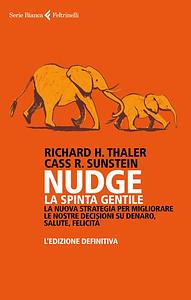Take a photo of a barcode or cover
Fantastic read
A very fantastic book to read that helps to understand many insights of human behaviour. Personally I consider every paragraph worth of very valuable information including postscript, notes & even acknowledgement. Although this book is just a beginning, it helps to slow us down, use more of our reflective minds, analyse the situation & act more like Econs . For sure the books help to raise the level of our thinking, raise our awareness & knowledge.
A very fantastic book to read that helps to understand many insights of human behaviour. Personally I consider every paragraph worth of very valuable information including postscript, notes & even acknowledgement. Although this book is just a beginning, it helps to slow us down, use more of our reflective minds, analyse the situation & act more like Econs . For sure the books help to raise the level of our thinking, raise our awareness & knowledge.
It’s an artful thing to create the right choices so that people are nudged gently into the behaviors that are best for them. That’s what Nudge: Improving Decisions about Health, Wealth, and Happiness is all about – helping people make the best choices for themselves. With the idea of libertarian paternalism, choice architects help to shape the way that people choose.
Click here to read the full review
Click here to read the full review
The concept of this book is a good one: because people have to make difficult decisions, society should be arranged to help them make the best decisions possible. The authors introduce the term “libertarian paternalism” to describe how to do this, and acknowledge that “We are keenly aware that this term is not one that readers will find immediately endearing.” (p. 4). This is true, but they do effectively defend the use of the term throughout the book. The point is that people can be encouraged to do the right thing in ways that are not oppressive or intrusive.
In particular, the recognition that capitalism doesn’t always result in the best incentives is important. A number of interesting conclusions result from this when combined with the psychology of human decision making, such as “the extended warranty is a product that simply should not exist.” (p. 81) And as noted later in the context of financial advisors, “The opportunity to fleece confused customers is valuable.” (p. 143). Businesses that exploit that value are of course unethical, but apparently some people value money over ethical behavior, which is unacceptable.
The discussions of the role of government and of businesses in creating proper incentives is excellent, and the authors present numerous ideas that are clearly rational, including proposals for default 401k options, suggested requirements for disclosures by mortgage lenders and credit card companies, and improved choice architecture for investments and health care. The somewhat radical suggestions for school choice, medical costs, and marriage (Part IV) are well-stated and logical, though I’m not convinced that there isn’t a better way to handle each of these cases.
But it seems clear to me that the authors’ sensibilities are in the right place; when addressing potential objections to their ideas, they conclude that “the evaluation of nudges depends on their effects—on whether they hurt people or help them.” (p. 312)
Although the overall “pop” science tone struck me as somewhat cutesy and occasionally a bit condescending compared to a more serious science book, there is plenty of interesting data presented and discussed.
In particular, the recognition that capitalism doesn’t always result in the best incentives is important. A number of interesting conclusions result from this when combined with the psychology of human decision making, such as “the extended warranty is a product that simply should not exist.” (p. 81) And as noted later in the context of financial advisors, “The opportunity to fleece confused customers is valuable.” (p. 143). Businesses that exploit that value are of course unethical, but apparently some people value money over ethical behavior, which is unacceptable.
The discussions of the role of government and of businesses in creating proper incentives is excellent, and the authors present numerous ideas that are clearly rational, including proposals for default 401k options, suggested requirements for disclosures by mortgage lenders and credit card companies, and improved choice architecture for investments and health care. The somewhat radical suggestions for school choice, medical costs, and marriage (Part IV) are well-stated and logical, though I’m not convinced that there isn’t a better way to handle each of these cases.
But it seems clear to me that the authors’ sensibilities are in the right place; when addressing potential objections to their ideas, they conclude that “the evaluation of nudges depends on their effects—on whether they hurt people or help them.” (p. 312)
Although the overall “pop” science tone struck me as somewhat cutesy and occasionally a bit condescending compared to a more serious science book, there is plenty of interesting data presented and discussed.
This book is intended for "choice architects": people who design situations where others have to make a decision. This includes policymakers, human resources professionals, and teachers; among others. The book advocates a policy of "libertarian paternalism": allowing people to make their own decisions, but subtly encouraging them in one direction through design of default options or explicit propaganda. I found it very interesting and useful for my job
It appears that my Behavioural economics paper is solely based on this.
I don't have the words to adequately describe how much I disliked this book. I am both shocked and appalled that it was so very popular.
The points it made one chapter were consistently back tracked a the end of the same chapter. Even the shortest bit of research on the nudges this book held up showed that basically every case really doesn't break down like it does in these pages. Rearranging school lunch options sounds great when taken as presented in the book but what it doesn't discuss is what foods were actually consumed vs taken.
The points it made one chapter were consistently back tracked a the end of the same chapter. Even the shortest bit of research on the nudges this book held up showed that basically every case really doesn't break down like it does in these pages. Rearranging school lunch options sounds great when taken as presented in the book but what it doesn't discuss is what foods were actually consumed vs taken.
I would give the book 4 stars unless you are already pretty familiar with the concepts, in which case more like 3 stars, since a lot of it is re-hash.
The message of the book: it really matters a lot how choices are structures (e.g. options in a health plan; food in a cafeteria), and that is just like any other form of power in that it can be used for good or ill. Governments should try to use it for good by framing choices in a way that most people will benefit from taking the option requiring least effort, yet they should still have the freedom of choice to select other options. sure it can be abused, but right not more often than not it is just ignored and govt is doing things which make it much harder than necessary for people to make reasonable decisions about certain things.
I basically buy that. Also many of the examples are interesting. But if you have read much in the pop economic field, you will already know 2/3 of the points they are making, and 1/2 the examples they give, and you might wish the book was somewhat shorter. But still, lots of interesting ideas, and reasonably engagingly written.
Some of the ideas aren't particularly fairly presented though. e.g. they propose to solve the gay marriage debate by basically separating church and state here, you can have gay marriages that get you the legal advantages of hetero marriages, but that churches are free to ban. the authors imagine that conservatives couldn't oppose such a freedom of choice policy, which seems patently untrue, as if people couldn't think gay marriage was wrong and actively want to discourage it through govt rules, as opposed to just not wanting to have a gay marriage themselves. personally I'm in favor of allowing gay marriage, but I didn't think the authors were really being fair here; seemed like a pretty weak straw man they set up on that one.
The message of the book: it really matters a lot how choices are structures (e.g. options in a health plan; food in a cafeteria), and that is just like any other form of power in that it can be used for good or ill. Governments should try to use it for good by framing choices in a way that most people will benefit from taking the option requiring least effort, yet they should still have the freedom of choice to select other options. sure it can be abused, but right not more often than not it is just ignored and govt is doing things which make it much harder than necessary for people to make reasonable decisions about certain things.
I basically buy that. Also many of the examples are interesting. But if you have read much in the pop economic field, you will already know 2/3 of the points they are making, and 1/2 the examples they give, and you might wish the book was somewhat shorter. But still, lots of interesting ideas, and reasonably engagingly written.
Some of the ideas aren't particularly fairly presented though. e.g. they propose to solve the gay marriage debate by basically separating church and state here, you can have gay marriages that get you the legal advantages of hetero marriages, but that churches are free to ban. the authors imagine that conservatives couldn't oppose such a freedom of choice policy, which seems patently untrue, as if people couldn't think gay marriage was wrong and actively want to discourage it through govt rules, as opposed to just not wanting to have a gay marriage themselves. personally I'm in favor of allowing gay marriage, but I didn't think the authors were really being fair here; seemed like a pretty weak straw man they set up on that one.
Can feel only mildly virtuous for going back to read this book I was supposed to have finished in grad school. Mostly, feel vindicated because most of the Actual Content was in the first 50 pages anyway.
Too much of a slog relative to the value it has to offer.




